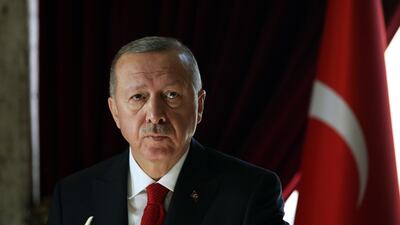Pro-government supporters in Turkey have recently revived talk of another coup attempt in what critics said was an effort to target opponents and distract from domestic concerns compounded by the coronavirus outbreak.
Nearly four years after a failed coup, followed by widespread purges of the military and other state institutions, the suggestion of another takeover attempt was met with scepticism by observers.
“It’s really confusing because who is there in the military to mount anything like that?” said Ahmet Evin, a political scientist and a senior fellow at the Istanbul Policy Centre think tank.
Since the attempt to remove President Recep Tayyip Erdogan in July 2016, nearly 19,500 members of the military, including many senior officers, have been dismissed in purges targeting the religious sect said to be behind the plot.
“There’s a tradition in Latin America that the army is the only institution that has its own ways and means,” said Mitat Celikpala, deputy rector at Kadir Has University in Istanbul. “However, under the current circumstances I don’t see any environment in which a coup could happen.”
Nevertheless, Mr Erdogan's backers insisted the threat remained. "They're still in the army, the press, the police, the bureaucracy, the municipalities and in politics," Ersin Ramoglu, a columnist for the pro-government Sabah newspaper, said last week.
Rhetoric about another coup threat came ahead of Wednesday’s anniversary of the 1960 putsch against Adnan Menderes, the first prime minister of Turkey’s multi-party era.
Mr Erdogan has compared himself to Menderes, who was hanged following the first of four successful military coups, the last of which was in 1997.
According to the president, both leaders struggled against military “tutelage” that repressed Islam in public life in the name of preserving the secularist model prescribed by Turkey’s founder Mustafa Kemal Ataturk.
“Menderes is remembered fondly because that was the first departure from the Kemalist regime, so [Mr Erdogan’s] group likes that very much,” Mr Evin said.
Recent claims of a conspiracy to remove the ruling Justice and Development Party (AKP) from power have tied a possible plot to the opposition.
This month, Mr Erdogan accused the Republican People’s Party (CHP) – founded by Ataturk and now the largest opposition party – of “still yearning and burning for coups, tutelage and juntas”.
In the following days, a number of pro-AKP figures spoke out about a potential coup, often in violent terms.
“You say ‘We will overthrow Tayyip Erdogan, we will execute him’,” journalist Fatih Tezcan said in an online video. “How will you protect your wife, your children from us? The blood of millions will spill for a single drop of Erdogan’s blood.”
Writer Sevda Noyan sparked outrage when she appeared on television to complain that her family “could not do what we really wanted to do” during the 2016 coup attempt before going on to claim she had prepared a list of targets and could “remove” 50 people.
Murat Emir, a CHP MP for Ankara, said the conspiracy claims aimed to paint the government and its base as the targets of secularists.
“With the current government, every opposition figure who expresses the need for change is accused of hinting at a coup,” he said. “Later, certain writers and journalists bubble into a rage. These and similar claims always have one purpose – to cover the real agenda with a perception operation.
“The real danger is that while those who blacklist neighbours and plan mass murder remain unpunished, people like Sevda Noyan and Fatih Tezcan are able to find the environment and courage to openly express their twisted thoughts.”
Rumours of a takeover came after the government lost major cities such as Ankara and Istanbul to the CHP in last year’s local elections. It has also been disturbed by the popularity of opposition-run municipal aid programmes during the coronavirus pandemic.
As the CHP’s municipal schemes have been targeted – Mr Erdogan said they were an attempt to establish a “parallel state” – the government has removed dozens of recently elected mayors in the Kurdish-majority south-east by linking them to terrorism.
Talk of a coup seemed to have been sparked by comments from Canan Kaftancioglu, chairwoman of the CHP in Istanbul and a leading party figure, at the end of April when she predicted a change in government “through early elections or some other way”.
Although she later clarified her remarks, they were seized on as suggesting the AKP’s removal by non-democratic means.
However, others suggest the worsening outlook for Turkey’s fragile economy under coronavirus is another factor in talk of a coup.
The Turkish lira hit an all-time low against the dollar this month as the effect of the pandemic on exports and tourism added to a growing current account deficit.
The International Monetary Fund has forecast that Turkey’s economy will shrink by 5 per cent this year, pushing up inflation and unemployment.
“Erdogan’s speculation about a potential coup is a convenient ploy to divert the public’s attention away from the economic crisis and financial mismanagement at home,” said Aykan Erdemir, senior director of the Foundation for Defence of Democracies’ Turkey programme.
Mr Evin said: “The economic situation is absolutely miserable and, regardless of who is in power, under these circumstances conspiracy theories abound. The whole atmosphere is conducive to this kind of thing because of the situation of instability.
“Things don’t seem to be adding up in a coherent way and there’s a tendency to exaggerate and find conspiracies behind anything.”



















